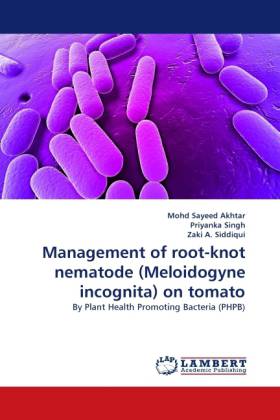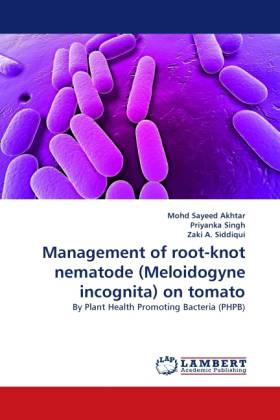
- Afhalen na 1 uur in een winkel met voorraad
- Gratis thuislevering in België vanaf € 30
- Ruim aanbod met 7 miljoen producten
- Afhalen na 1 uur in een winkel met voorraad
- Gratis thuislevering in België vanaf € 30
- Ruim aanbod met 7 miljoen producten
Zoeken
Management of root-knot nematode (Meloidogyne incognita) on tomato
By Plant Health Promoting Bacteria (PHPB)
Mohd Sayeed Akhtar, Priyanka Singh, Zaki A Siddiqui
Paperback | Engels
€ 48,45
+ 96 punten
Omschrijving
Soil serves as an excellent reservoir for the rhizospheric microorganisms and these microorganisms provide front line defense against the pathogens attack to root. Among the different type of soil microorganisms plant health promoting bacteria (PHPB) had the ability to promote the plant growth and also reduced the severity of diseases caused by soil borne pathogens.The bacteria can profoundly, improve the seed germination, root development, and water uptake by plants. Beside this they can also improve the nutrient uptake or indirectly by changing the microbial balance in favour of beneficial microorganisms in the rhizosphere and can suppress the broad spectrum of plant borne plant pathogens.Considering the importance of these symbionts in the plant disease protection, it came into highlight for research that the combined application of these microorganisms is more beneficial than use of single agent and provides a better management against the plant parasitic nematodes.
Specificaties
Betrokkenen
- Auteur(s):
- Uitgeverij:
Inhoud
- Aantal bladzijden:
- 84
- Taal:
- Engels
Eigenschappen
- Productcode (EAN):
- 9783844395839
- Verschijningsdatum:
- 16/05/2011
- Uitvoering:
- Paperback
- Formaat:
- Trade paperback (VS)
- Afmetingen:
- 152 mm x 229 mm
- Gewicht:
- 136 g

Alleen bij Standaard Boekhandel
+ 96 punten op je klantenkaart van Standaard Boekhandel
Beoordelingen
We publiceren alleen reviews die voldoen aan de voorwaarden voor reviews. Bekijk onze voorwaarden voor reviews.











